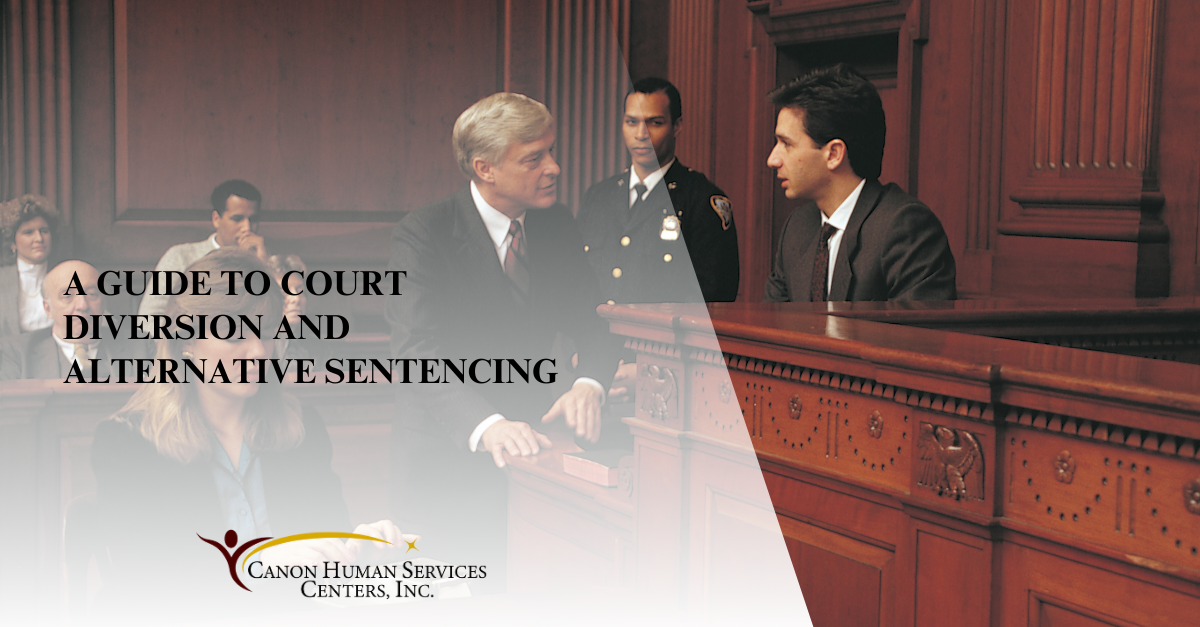For individuals struggling with substance use who find themselves involved with the legal system, the path forward can seem uncertain. Traditionally, the justice system has leaned towards punitive measures like incarceration. However, a more compassionate and effective approach is gaining traction: diversion and alternative sentencing programs. These programs offer a pathway to recovery by prioritizing rehabilitation over punishment.
At Canon Human Services, our Brown Scapular Program has been dedicated to this mission since 1988. We believe that addressing the root causes of substance dependency is crucial for both individual well-being and community safety. Through our court liaison assistance services, we collaborate with the legal system to connect individuals with the support they need to overcome chemical dependency and rebuild their lives.
This post will explore how court diversion and alternative sentencing work, the role of a court liaison, and how these programs can offer a new beginning for those facing drug-related legal challenges.
Understanding Diversion and Alternative Sentencing
What exactly are diversion and alternative sentencing? While the specifics can vary by jurisdiction, the core idea is to redirect individuals with substance use disorders away from the traditional criminal justice process and into treatment-focused programs.
- Diversion Programs: These programs typically intervene early in the legal process, sometimes even before formal charges are filed. A person might be “diverted” from the court system on the condition that they complete a substance abuse treatment program. Successful completion can lead to charges being dropped, helping the individual avoid a criminal record that could create long-term barriers to employment and housing.
- Alternative Sentencing: This occurs after an individual has been convicted of a crime. Instead of a jail or prison sentence, a judge may order them to participate in a structured rehabilitation program. This could involve residential treatment, intensive outpatient counseling, or other support services designed to address their addiction. The sentence is served within a therapeutic environment rather than a correctional facility.
The primary goal of both approaches is to break the cycle of addiction and recidivism. By treating substance use as a public health issue rather than a purely criminal one, these programs equip individuals with the tools they need for lasting recovery.
The Role of Court Liaison Assistance
Navigating the intersection of the legal system and addiction treatment can be complex and overwhelming. This is where a court liaison assistance program becomes invaluable. A court liaison acts as a bridge for the treatment provider.
At Canon Human Services, our court liaisons are dedicated professionals who advocate for individuals in need of care. Their responsibilities include:
- Assessment: Conducting thorough assessments to understand the individual’s history of substance use, mental health, and specific treatment needs.
- Collaboration with Legal Professionals: Working closely with defense attorneys, prosecutors, and judges to present a comprehensive picture of the individual’s situation and recommend a suitable treatment plan as an alternative to incarceration.
- Treatment Placement: Connecting the individual with the appropriate level of care, whether it’s our residential program or outpatient services.
- Progress Reporting: Providing regular updates to the court on the individual’s progress in treatment, ensuring transparency and accountability.
- Support and Guidance: Offering support to the individual and their family throughout the legal and treatment process, helping them understand what to expect and how to navigate challenges.
Through expert court liaison assistance, we ensure that individuals have a strong advocate in their corner, one who can effectively communicate to the court that recovery is not only possible but also the most constructive path forward.
How We Can Help with Court Liaison Assistance
Since 1988, Canon Human Services has been a trusted non-profit community service corporation committed to helping people resolve drug-related problems. Our Brown Scapular Program offers a continuum of care tailored to meet each person’s unique needs.
Outpatient Services
For individuals who can maintain their daily responsibilities while receiving care, our outpatient program provides a structured yet flexible approach to recovery. Services include:
- Individual and group counseling
- Drug-free support services
- Educational workshops on relapse prevention and life skills
Residential Treatment
For those requiring a more intensive and immersive environment, our residential setting offers a safe and supportive space to focus entirely on recovery. This program provides:
- 24/7 support and supervision
- A structured daily routine
- In-depth therapeutic services
- A community of peers who share similar goals
Our collaboration with the courts allows us to integrate these treatment options into diversion and alternative sentencing plans, creating a seamless transition from the legal system to a recovery-oriented environment.
The Benefits of a Recovery-Focused Approach
Choosing rehabilitation over incarceration offers profound benefits for individuals, their families, and the community as a whole.
- Reduced Recidivism: Studies consistently show that individuals who complete substance abuse treatment programs are less likely to re-offend compared to those who are incarcerated without receiving treatment.
- Improved Health Outcomes: Treatment provides individuals with the medical and psychological support needed to manage their addiction and any co-occurring health issues, leading to better long-term health.
- Cost-Effectiveness: Investing in treatment is often more cost-effective for taxpayers than the high price of incarceration.
- Stronger Communities: When individuals successfully recover, they can become productive members of their communities—reconnecting with family, securing employment, and contributing positively to society.
A New Path Forward
The journey from addiction and legal trouble to a life of recovery is challenging, but it is a journey that no one should have to walk alone. Court diversion and alternative sentencing programs, supported by dedicated court liaison assistance, represent a hopeful and effective alternative to the revolving door of the criminal justice system.
If you or a loved one is facing drug-related legal issues and struggling with chemical dependency, know that help is available. Canon Human Services is here to provide the professional support and compassionate care needed to navigate the courts and embark on a meaningful path to recovery.

